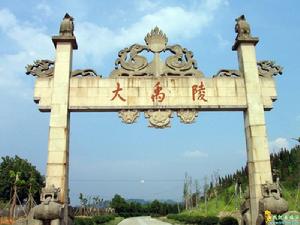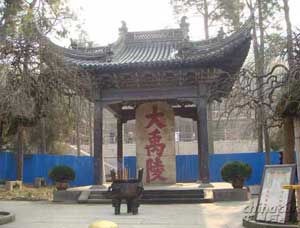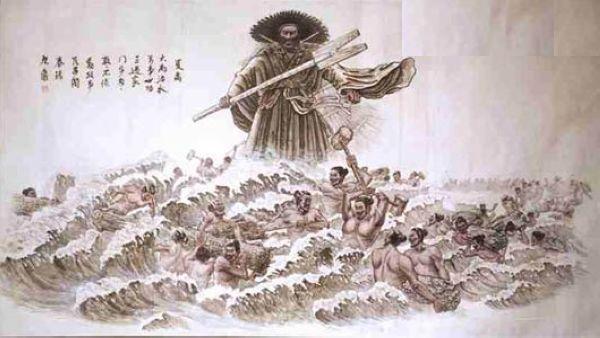Great Yu Controlled the Flood
Yu replied, “Then give me some magic earth and your permission, and allow me to complete my father’s work.” Secretly, the Yellow Emperor agreed that the world was a big, muddy mess. None of his gods had any ideas about how to stop the raging rivers that flooded the country year after year. Kun had tried to divert the rivers with dams but had failed. Therefore, every spring, the rivers continued to burst their banks, drown innocent people, and destroy property. Furthermore, the emperor was pleased that Yu had asked for the magic earth, rather than attempt to steal it. At last, the emperor said to Yu, “Pile the magic dirt on the back of this tortoise and go forth to control the floodwaters. With the help of this tortoise and a winged dragon, rebuild the world in your father’s vision.”
The ruling king in this story is the Yellow Emperor, a good leader who struggled with the mighty rivers that flooded the country each year. According to ancient myths, the Yellow Emperor had a pile of magic dirt that could absorb water. His grandson Kun stole the magic earth (in Chinese: Xi-Rang) and dropped little balls of dirt wherever he went. The dirtballs swelled into huge, fertile mounds of soil as they absorbed water. The peasants then scooped up the fertile soil and spread it over their sopping fields. Kun also built dams to control the flooding of the country’s unpredictable rivers. Unfortunately, the dams often burst and flooded the land again. When the emperor found out about the theft, he was furious and sent Zurong the fire god, now the chief executioner, to track down and kill his grandson Kun. Zurong chased Kun to the ice glaciers of the arctic and struck him dead with a flaming sword. Kun’s body lay trapped and frozen in the ice.
Three years later, the Yellow Emperor sent Zurong the fire god to check on his grandson Kun’s body. When he reached the spot where Kun was buried in the ice, the fire god was amazed to find that Kun’s body was perfectly preserved in the ice. As he hacked open the glacier with his sword, Zurong accidentally split open Kun’s body. A huge Loong flew out of the corpse. Terrified, Zurong fled to warn the Yellow Emperor. The huge Loong became Yu, son of Kun, who was born with all the memories and knowledge of his father.
Like his father, Yu was filled with compassion for the farmers. However, unlike his father, he did not wish to incur the wrath of the Yellow Emperor. Immediately, he hurried to the Yellow Emperor’s court. Bowing before the ruler, Yu pleaded for the lives of the farmers, “Your majesty, I beg you to pity the people for their suffering. Please help them restore their land.” The Yellow Emperor was not impressed with Yu’s pleas. He bellowed, “Do not forget that your father stole my magic earth and tried to restore the land without my permission!”
Yu replied, “Then give me some magic earth and your permission, and allow me to complete my father’s work.” Secretly, the Yellow Emperor agreed that the world was a big, muddy mess. None of his gods had any ideas about how to stop the raging rivers that flooded the country year after year. Kun had tried to divert the rivers with dams but had failed. Therefore, every spring, the rivers continued to burst their banks, drown innocent people, and destroy property. Furthermore, the emperor was pleased that Yu had asked for the magic earth, rather than attempt to steal it. At last, the emperor said to Yu, “Pile the magic dirt on the back of this tortoise and go forth to control the floodwaters. With the help of this tortoise and a winged dragon, rebuild the world in your father’s vision.”
Yu was curious about the size and shape of the earth. Therefore, before leaving the emperor’s court, he dispatched one of the lesser court gods to measure the country north/south and another god to measure the country east/west. Each returned to report exactly the same number: 233,500 li (three li make one mile) and 75 paces. Delighted, Yu created a map from the gods’ descriptions, which made the earth a perfect square. Then Yu divided the country into nine areas, or provinces. Only then did he begin his construction work.
Unlike his father, Yu was not content merely to build dams to control the rivers. Instead, he studied the shape of the land in each area. He observed the course of the rivers and planned their most natural route to the sea. To guide the rivers, Yu dug canals, carved tunnels, leveled hilltops, created dams, and formed lakes. In each area, Yu used the tail of the dragon to gouge out new channels for the rivers.
As he plodded across the country, Yu found 233,559 large holes in the earth. Year after year, water had bubbled up in these cavities and flooded the world. Now Yu plugged up the gaping holes with dirt and reeds, and dropped in magic dirt balls from the tortoise’s back to dry up the soggy earth caused by the floods.
When he worked, Yu often used the form of a human to avoid frightening the farmers. Even in his human form, he had an ugly face like an insect, with a mouth like the bottom of a crow’s beak and a long neck like a snake. The farmers did not care about his appearance, however. They loved him for his efforts on their behalf.
As Yu traveled across China, he named the tribal groups and recorded their customs: Leather-Skin people; Goat-Fur people; Oyster-and-Pearl people; Kingfisher?Green-Silk people; Grass-Skirt people; Felt-Tent people; Mountains-of-Jewels people; Dew-Drinkers; Red-Grain-Growers; Lacquer-Makers; Winged people; Short people; Deep-Set-Eyes people. He charted their land and collected samples of their soil as he traveled across the fifty rivers and mountains of China.
Wherever he went, Yu found happy families. Their happiness only made him aware of his own loneliness. Although Yu was married briefly, his wife and son both abandoned him because they had no fondness for digging dirt. With neither wife nor son by his side, Yu continued his work alone, with only the tortoise and the dragon for company. His hands were covered with sores and calluses. His skin was blackened and blistered from the sun. One leg shriveled and twisted as Yu limped around the rough terrain. Wherever he traveled, farmers hailed him as the Great Yu.
Their widespread affection caused the ruling emperor to choose Yu as the next emperor. It was thus that Yu became the founder and ruler of the Xia [She ah] dynasty. Soon plentiful grain harvests blessed the land. The rivers ran peacefully to the sea and did not overflow. The people lived happily in their villages and blessed the name of Yu in their joy and contentment.
Da-Yu-Zhi-Shui: The Great Yu and the terrible Flood-Edition 2
—The establish of the Xia Dynasty ( 2070-1600 BC )
Legend has it that some four or five thousand years ago there occurred once in the Yellow River valley a terrible flood which washed away whole villages with their houses and inundated large areas of cropland. Many people lost their lives in the flood and those who were fortunate enough to survive were forced to abandon their homes and go and live on hillsides or migrate to places far, far away.
At that time, the leader of the confederation of tribes was a man named Yao who at once summoned together the chieftains of all the tribes to discuss how to get the flood under control. At the meeting, a man named Gun was elected by unanimous vote to take charge of the fight against the flood.
Under Gun’s leadership, the people spent nine long years building dams and dykes to stop the flow of the rivers. All the efforts however ended only in more disastrous floods. It happened more than once that no sooner was a dam or dyke built than it was destroyed by flood which carried sands and mud downstream until the mouth of the Yellow River was choked up and the afflicted areas became larger and larger while the number of victims increased.
By this time Yao himself was getting very old and so he yielded his place to one named Shun who attached great importance to flood control and went to the work sites for a personal inspection. When he found that Gun had failed in his mission, he first had him incarcerated on Feather Hill and then killed. After that he gave orders that Gun’s son Yu should carry on the work of fighting the flood.
There have been many mythical stories about Yu’s birth. One is that three years after Gun was killed, his dead body still showed no signs of putrefaction and when someone cut it open, out bounded the boy Yu. Another has it that Yu’s mother gave birth to him after eating a kind of wild fruit. Anyway, in ancient times everyone seemed to believe that Yu was the son of a god, an ingenious, capable and peerless hero.
It was barely four days after he got married when Yu received Shun’s order. Determined to have the flood under control and remove the menace to the people, he left his wife behind and set off for the work site.
Yu first made a study of the causes that had led to his father’s failure. Then he made a careful survey of the afflicted areas and asked for advice from experienced workers. Knowing that water tends to flow from higher to lower regions, he abandoned Gun’s method of building dams and dykes to stop the flow of waters. Instead he led his men in digging ditches and canals to divert the flood and also in dredging the river channels so as to provide outlets for the floods into the sea. In those days there was a high mountain, Mount Longmen, in the upper reaches of the Yellow River that blocked the way of the river. When the turbulent waters reached the mountain, it overflowed the banks, causing floods in the vicinity. In order to cut a canal into the mountain, Yu turned himself into a bear and stole into the mountains to do the digging. He also enlisted the help of Ying Long, Huang Di’s brave warrior. Eventually, he succeeded in cutting a canal through Mount Longmen and thus made it possible for the floods to flow by way of this canal and the dredged rivers into the sea.
Rain or shine, Yu worked in the midst of his men, digging and taking earth away all through the four seasons of a year. His face became sun-burnt and his body spare and thin. Even the hair on his calves was worn away. But he was so dedicated that it was said that he had three times refrained from entering the door of his home when he was passing by. One story has it that he happened to be passing the door when his wife was giving birth to his son Qi. He heard the baby crying, but in order to get the flood under control as early as he could he turned away from his door.
 Thus after thirteen long years of continuous efforts, Yu and his men succeeded in dredging all the rivers, big and small, and in doing away with the evil of flood. Those who had gone to live on hillsides or had migrated to remote places now came back to their native places. Under Yu’s leadership, they tilled the land and planted crops and developed agricultural production. As a result, people were beginning to lead a good life.
Thus after thirteen long years of continuous efforts, Yu and his men succeeded in dredging all the rivers, big and small, and in doing away with the evil of flood. Those who had gone to live on hillsides or had migrated to remote places now came back to their native places. Under Yu’s leadership, they tilled the land and planted crops and developed agricultural production. As a result, people were beginning to lead a good life.
Yu was held in great reverence by all the tribes who now addressed him as Yu the Great. Shun was convinced that Yu had both fine qualities and great competence and so recommended him as his successor. After the death of Shun, Yu became the head of the tribal confederation. Later his own son Qi set himself as the successor and it was Qi that set up the first slave-owning state in Chinese history – the Xia Dynasty.
